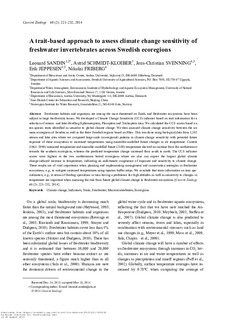A trait-based approach to assess climate change sensitivity of freshwater invertebrates across Swedish ecoregions
Sandin, Leonard; Schmidt-Kloiber, Astrid; Svenning, Jens-Christian; Jeppesen, Erik; Friberg, Nikolai
Journal article, Peer reviewed
Published version
Permanent lenke
http://hdl.handle.net/11250/2507645Utgivelsesdato
2014Metadata
Vis full innførselSamlinger
- Scientific publications [1172]
Sammendrag
Freshwater habitats and organisms are among the most threatened on Earth, and freshwater ecosystems have been subject to large biodiversity losses. We developed a Climate Change Sensitivity (CCS) indicator based on trait information for a selection of stream- and lake-dwelling Ephemeroptera, Plecoptera and Trichoptera taxa. We calculated the CCS scores based on ten species traits identified as sensitive to global climate change. We then assessed climate change sensitivity between the six main ecoregions of Sweden as well as the three Swedish regions based on Illies. This was done using biological data from 1,382 stream and lake sites where we compared large-scale (ecoregional) patterns in climate change sensitivity with potential future exposure of these ecosystems to increased temperatures using ensemble-modelled future changes in air temperature. Current (1961~1990) measured temperature and ensemble-modelled future (2100) temperature showed an increase from the northernmost towards the southern ecoregions, whereas the predicted temperature change increased from south to north. The CCS indicator scores were highest in the two northernmost boreal ecoregions where we also can expect the largest global climate change-induced increase in temperature, indicating an unfortunate congruence of exposure and sensitivity to climate change. These results are of vital importance when planning and implementing management and conservation strategies in freshwater ecosystems, e.g., to mitigate increased temperatures using riparian buffer strips. We conclude that traits information on taxa specialization, e.g., in terms of feeding specialism or taxa having a preference for high altitudes as well as sensitivity to changes in temperature are important when assessing the risk from future global climate change to freshwater ecosystems [Current Zoology 60 (2): 221–232, 2014].
